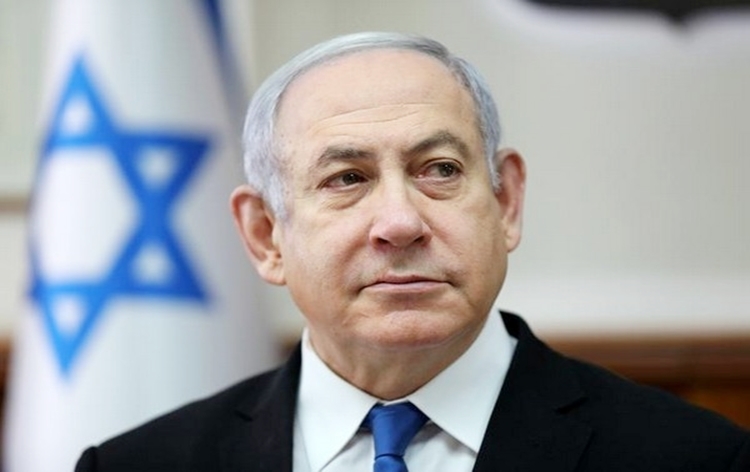Israelis awaited word on how Prime Minister Benjamin Netanyahu would respond to Iran’s first-ever direct attack as international pressure for restraint grew amid fears of an escalation of the conflict in the Middle East. Netanyahu on Monday summoned his war cabinet for the second time in less than 24 hours to weigh a response to Iran’s weekend missile and drone attack, a government source said.
Military Chief of Staff Herzi Halevi said Israel would respond. He provided no details. “This launch of so many missiles, cruise missiles, and drones into Israeli territory will be met with a response,” he said at the Nevatim Airbase in southern Israel, which sustained some damage in Saturday night’s attack.
The prospect of Israeli retaliation has alarmed many Iranians already enduring economic pain and tighter social and political controls since protests in 2022-23. Iran launched the attack in retaliation for what it says was an April 1 Israeli airstrike on its embassy compound in Damascus, and signalled that it does not seek further escalation.
While the attack caused no deaths and limited damage, it has increased fears of open warfare between the long-time foes and fuelled concerns that violence rooted in the Gaza war is spreading.
U.S. President Joe Biden told Netanyahu at the weekend that the United States, which helped Israel blunt the Iranian attack, will not participate in an Israeli counter-strike.
Since the war in Gaza began in October, clashes have erupted between Israel and Iran-aligned groups in Lebanon, Syria, Yemen and Iraq. Israel said four of its soldiers were wounded hundreds of meters inside Lebanese territory overnight.
It appeared to be the first such known incident since the Gaza war erupted, although there have been several exchanges of fire between Israel and Lebanon’s armed group Hezbollah.
“We’re on the edge of the cliff and we have to move away from it,” Josep Borrell, the European Union’s foreign affairs chief, told Spanish radio station Onda Cero. “We have to step on the brakes and reverse gear.”
French President Emmanuel Macron, German Chancellor Olaf Scholz and British Foreign Secretary David Cameron made similar appeals. Washington and United Nations Secretary-General Antonio Guterres also have called for restraint.
White House national security spokesman John Kirby declined on Monday to say if Biden urged Netanyahu in talks on Saturday night to exercise restraint in responding to Iran.
“We don’t want to see a war with Iran. We don’t want to see a regional conflict,” Kirby told a briefing, adding that it was for Israel to decide “whether and how they’ll respond.”
U.S. Defense Secretary Lloyd Austin, in calls on Monday with counterparts in the Middle East and Europe, said “while the United States does not seek escalation, we will continue to defend Israel and U.S. personnel,” the Pentagon said.
Russia has refrained from publicly criticising its ally Iran but has also urged restraint. “Further escalation is in no one’s interests,” Kremlin spokesman Dmitry Peskov said. China said it believed Iran could “handle the situation well and spare the region further turmoil” while safeguarding its sovereignty and dignity.
Chinese Foreign Minister Wang Yi told his Iranian counterpart Hossein Amir-Abdollahian in a phone call on Monday that China also appreciated Iran’s emphasis on not targeting regional and neighbouring countries, according to the official Xinhua news agency on Tuesday.
Iran mounted its attack after the April 1 killing in Damascus of seven Iranian Revolutionary Guards officers, including two senior commanders. Israel neither confirmed nor denied carrying out the strike.
G7 MULLS IRAN SANCTIONS
Iran’s retaliatory attack, involving more than 300 missiles and drones, caused modest damage in Israel and wounded a 7-year-old girl. Most were shot down by Israel’s Iron Dome defence system and with help from the U.S., Britain, France and Jordan.
In Gaza itself, where more than 33,000 Palestinians have been killed in the Israeli offensive according to Gaza health ministry figures, Iran’s action drew applause. Israel began its campaign against Hamas after the Palestinian militant group attacked Israel on Oct. 7, killing 1,200 people and taking 253 hostages by Israeli tallies.
British Prime Minister Rishi Sunak said the Group of Seven major democracies were working on a package of coordinated measures against Iran. “I spoke to my fellow G7 leaders, we are united in our condemnation of this attack,” Sunak said in parliament.
Italy, which holds the rotating G7 presidency, said it was open to new sanctions and suggested any new measures would target individuals. In an interview with Reuters, Italian Foreign Minister Antonio Tajani said all G7 members would have to back new sanctions.
Iran’s attack has disrupted travel, with at least a dozen airlines cancelling or rerouting flights, and Europe’s aviation regulator reaffirming advice that airlines use caution in Israeli and Iranian airspace.
(Reporting by James MacKenzie and Maayan Lubell in Jerusalem, Parisa Hafezi in Dubai, Jeff Mason and Daphne Psaledakis in Washington, Suleiman al-Khalidi in Amman and Nidal al-Mughrabi and Adam Makary in Cairo; writing by Jonathan Landay and Lincoln Feast; Editing by Rosalba O’Brien and Miral Fahmy). (Reuters)














